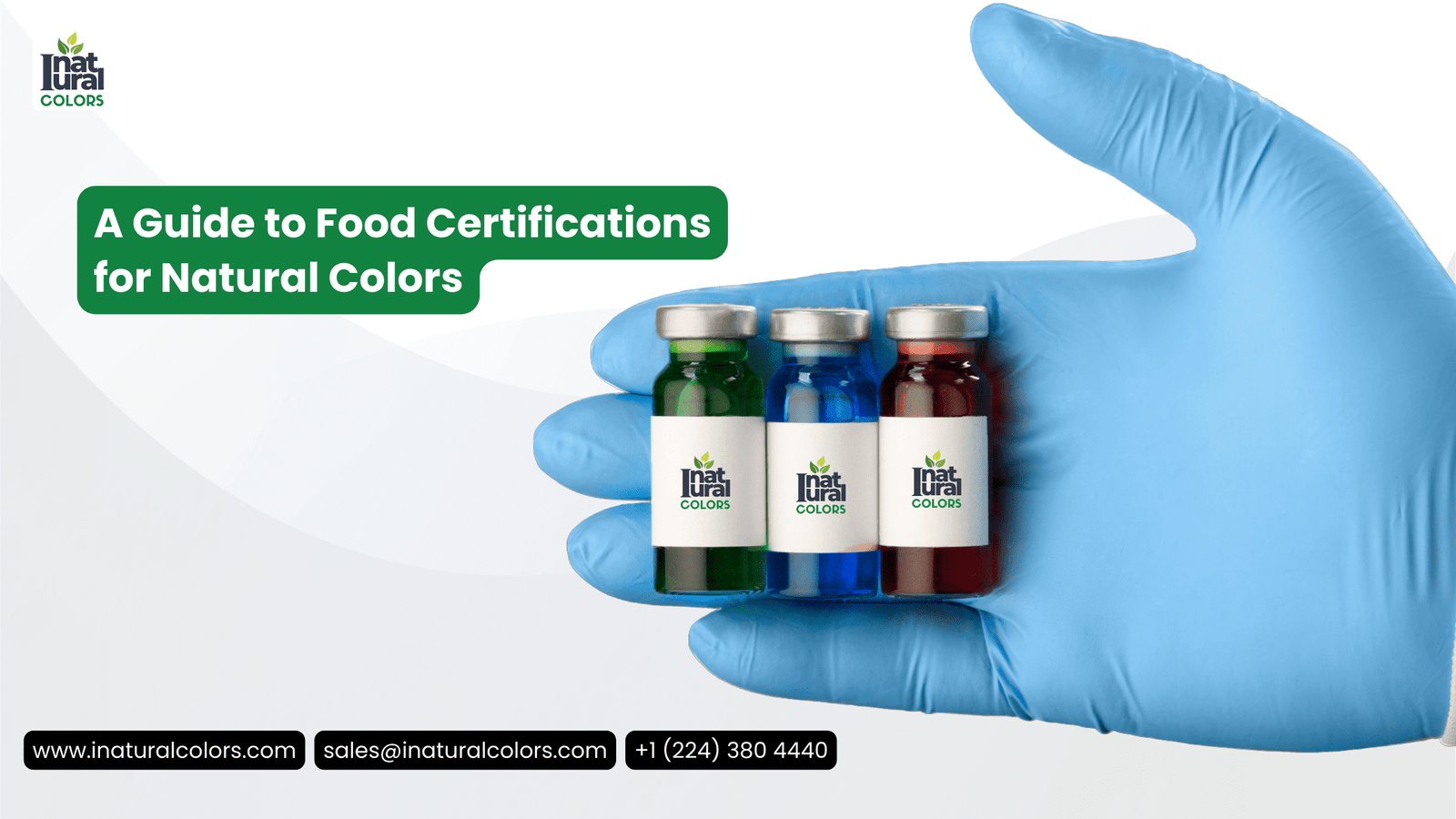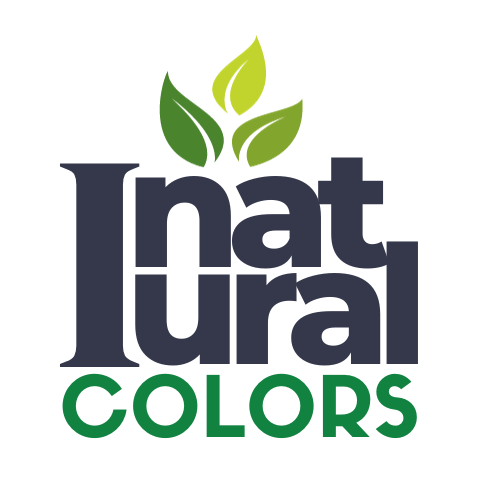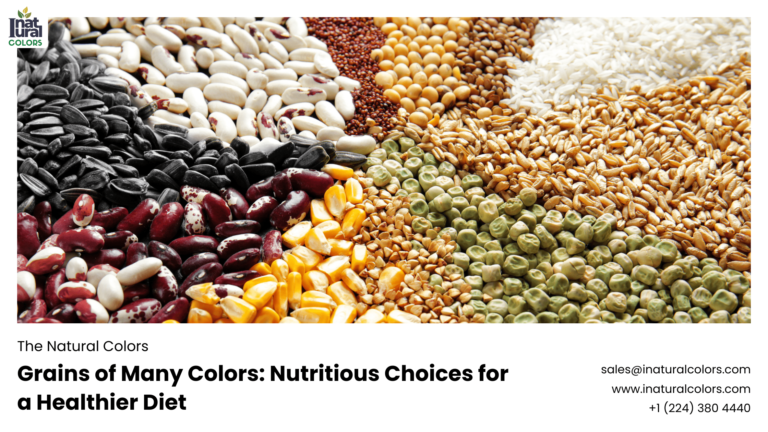Beautiful Plants For Your Interior

A Guide to Food Certifications for Natural Colors
As consumers become increasingly health-conscious and environmentally aware, the demand for natural food products, including natural colors, is on the rise. The food industry has responded by offering a variety of natural color options derived from plants, minerals, and other natural sources. However, with this increase in demand, the need for credible food certifications has become more crucial than ever. These certifications ensure that natural colors meet stringent standards for quality, safety, and sustainability.
What Are Natural Colors?
Natural colors are derived from natural sources such as fruits, vegetables, seeds, spices, algae, and minerals. Unlike synthetic colors, which are created through chemical processes, natural colors are extracted through physical processes or fermentation. They are preferred for their safety, environmental benefits, and ability to cater to the growing consumer preference for clean-label products.
Why Are Food Certifications Important?
Food certifications play a critical role in the food industry by ensuring that products meet specific standards for safety, quality, and sustainability. For natural colors, these certifications verify that the products are free from harmful additives, produced sustainably, and adhere to ethical practices. Certifications provide transparency and build trust with consumers, who increasingly demand assurance about the origins and quality of the products they consume.
Key Food Certifications for Natural Colors
1. Organic Certification
Organic certification is one of the most recognized certifications in the food industry. It ensures that natural colors are produced without synthetic pesticides, fertilizers, genetically modified organisms (GMOs), and ionizing radiation.
- USDA Organic (United States): The USDA Organic seal guarantees that at least 95% of the ingredients are organically produced.
- EU Organic (Europe): Similar to the USDA Organic, this certification ensures compliance with organic farming regulations in the European Union.
- JAS Organic (Japan): The Japanese Agricultural Standard for organic products ensures adherence to organic practices specific to Japan.
Statistics show that the global organic food market is projected to reach $272.18 billion by 2027, growing at a CAGR of 12.2% from 2020 to 2027 . This growth reflects the increasing consumer preference for organic products, including natural colors.
2. Non-GMO Certification
Non-GMO certification ensures that natural colors are produced without genetically modified organisms. This certification is vital for consumers who are concerned about the potential health and environmental impacts of GMOs.
- Non-GMO Project Verified (North America): The Non-GMO Project offers rigorous standards for GMO avoidance, testing, and segregation.
- GMO-Free (Europe): Various European certification bodies provide GMO-free certifications to ensure products meet non-GMO standards.
3. Fair Trade Certification
Fair Trade certification ensures that the production of natural colors adheres to fair labor practices and provides fair wages to workers. It also promotes sustainable farming practices and community development.
- Fairtrade International (FLO): This certification is one of the most recognized for fair trade products, ensuring ethical treatment of workers and sustainable practices.
- Fair Trade USA: Similar to FLO, this certification focuses on fair wages, safe working conditions, and environmental sustainability.
4. Kosher Certification
Kosher certification indicates that natural colors comply with the dietary laws of Judaism. This certification is important for consumers who follow kosher dietary restrictions and ensures that the production processes meet strict cleanliness and purity standards.
- OU Kosher (Orthodox Union): One of the most recognized kosher certifications in the world, ensuring compliance with kosher laws.
- KOF-K Kosher: Another prominent kosher certification agency that provides rigorous standards for kosher compliance.
5. Halal Certification
Halal certification ensures that natural colors meet the dietary laws of Islam. This certification is crucial for Muslim consumers and indicates that the products are free from alcohol, pork derivatives, and other non-halal substances.
- Halal Certification Services (HCS): Provides halal certification based on Islamic dietary laws.
- Islamic Food and Nutrition Council of America (IFANCA): A leading halal certification body that ensures compliance with halal standards.
6. Vegan Certification
Vegan certification verifies that natural colors contain no animal products or by-products and are not tested on animals. This certification is essential for the growing vegan population and those concerned with animal welfare.
- Vegan Society Trademark: One of the most recognized vegan certifications, ensuring products are free from animal ingredients and testing.
- Certified Vegan: Provided by the Vegan Awareness Foundation, this certification ensures that products meet strict vegan standards.
7. Gluten-Free Certification
Gluten-free certification ensures that natural colors do not contain gluten, which is crucial for consumers with celiac disease or gluten sensitivity.
- Gluten-Free Certification Organization (GFCO): Provides stringent gluten-free certification to ensure products contain less than 10 ppm of gluten.
- Celiac Support Association (CSA): Offers gluten-free certification with even stricter standards, requiring products to contain less than 5 ppm of gluten.
The Process of Certification
The process of obtaining food certifications involves several steps:
- Application: The manufacturer applies for certification, providing detailed information about their products and production processes.
- Review: The certifying body reviews the application and requests additional documentation if necessary.
- Inspection: An on-site inspection is conducted to verify compliance with the certification standards.
- Testing: Samples may be tested in laboratories to ensure they meet the required criteria.
- Certification: If the product passes all the requirements, the certification is granted. The manufacturer can then use the certification logo on their products.
Benefits of Food Certifications for Natural Colors
1. Consumer Trust
Certifications provide transparency and build trust with consumers. They assure consumers that the natural colors they purchase meet high standards for safety, quality, and sustainability.
2. Market Access
Many retailers and markets require certifications for products to be sold. Certifications open doors to new markets and ensure compliance with regulatory requirements.
3. Brand Differentiation
Certifications help brands stand out in a competitive market. They signal a commitment to quality and ethical practices, attracting health-conscious and environmentally aware consumers.
4. Regulatory Compliance
Certifications ensure that natural colors comply with local and international regulations. This reduces the risk of legal issues and recalls, protecting the brand’s reputation.
5. Sustainability
Many certifications promote sustainable practices, which help protect the environment and support long-term agricultural viability.
Challenges in Obtaining Food Certifications
1. Cost
The certification process can be costly, involving fees for application, inspection, testing, and ongoing compliance.
2. Complexity
Navigating the different certification requirements can be complex, especially for manufacturers operating in multiple markets.
3. Time-Consuming
The certification process can be time-consuming, taking several months to complete. This can delay product launches and market entry.
Future Trends in Food Certifications
1. Increased Demand for Transparency
Consumers are increasingly demanding transparency about the origins and production processes of their food. This trend is likely to drive further demand for certifications.
2. Technological Advancements
Advancements in technology, such as blockchain, are being used to enhance transparency and traceability in the food supply chain. This could simplify the certification process and provide additional assurance to consumers.
3. Sustainability Focus
Sustainability will continue to be a key focus, with more certifications incorporating environmental criteria and promoting sustainable practices.
4. Health and Wellness
As the focus on health and wellness grows, certifications related to organic, non-GMO, and gluten-free products will become even more important.
Conclusion
Food certifications for natural colors are essential for ensuring safety, quality, and sustainability in the food industry. They provide consumers with the assurance they need and help manufacturers meet regulatory requirements and market demands. As the demand for natural colors continues to grow, obtaining the right certifications will be crucial for success in this competitive market.



